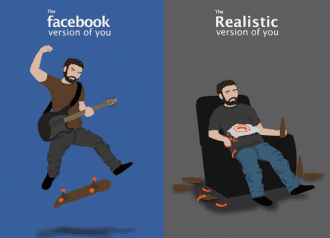Contributing writer for Wake Up World
Every month, 1.65 billion people actively use the social media site Facebook. On average, each user spends 50 minutes using the site daily, which doesn’t sound like that much until you consider it’s more time than is spent on any other leisure activity except for watching TV.[1] In the U.S., Americans spend just 19 minutes, on average, reading each day and just 17 minutes on exercise, according to the Bureau of Labor Statistics.[2] So the nearly one hour spent on Facebook is significant; it’s about the same amount of time spent eating and drinking (just over one hour).
Further, it’s just an average. Some people spend far more than one hour perusing Facebook every day (teens, for instance, may spend up to nine hours), the consequences of which are only beginning to be understood.
Lurking on Facebook May Make You Depressed
Spend any time on Facebook and you’ll be inundated with photos and posts depicting other people’s seemingly perfect families and lives. Such posts can induce feelings of envy and lead to unrealistic social comparisons that in turn bring down your mood and level of well-being. It can even lead to depression.[3]
[pro_ad_display_adzone id=”110028″]
A new study of more than 1,000 people in Denmark further revealed causal evidence that “Facebook affects our well-being negatively.”[4] Facebook users who took a one-week break from the site reported significantly higher levels of life satisfaction and a significantly improved emotional life, the study revealed. Such gains were greatest among heavy Facebook users, those who used the site passively (lurking but not necessarily interacting with others) and those who tended to envy others on Facebook.
If you’re a regular Facebook user interested in increasing your well-being, it might not be necessary to quit the site for good, however. The researchers suggested making adjustments in your usage behavior could be enough to prompt positive change:[5]
“To make things clear, if one is a heavy Facebook user, one should use Facebook less to increase one’s well-being. And if one tends to feel envy when on Facebook, one should avoid browsing the sections (or specific friends) on Facebook causing this envy.
“And if one uses Facebook passively, one should reduce this kind of behavior. Due to habits, practicalities and potential ‘forecasting errors’, it may be difficult to change one’s way of using Facebook. If this is the case, one should consider quitting Facebook for good.”
Forecasting Error: People Expect to Feel Better After Facebook Use — but Don’t
The aforementioned “forecasting errors” the researchers spoke of refer to a past study that found people expect to feel better after Facebook use, “whereas, in fact, they feel worse.”[6] This makes perfect sense because if everyone expected Facebook to make them feel awful, they’d probably stop using it. Yet, on some level, many realize that using Facebook puts a damper on their mood.
Part of this is due to a feeling of having wasted time, according to a Computers in Human Behavior study, which also found Facebook activity (but not internet browsing in general) is associated with a dampened mood.[7]
Another study, conducted by researchers from Lancaster University in England, examined studies from 14 countries to explore the connection between Facebook usage and depression. ” … [T]he relationship between online social networking and symptoms of depression may be complex and associated with multiple psychological, social, behavioral and individual factors,” they noted.[8] It was found that negative comparisons with others on Facebook were predictive of depression because they increased rumination.
Likewise, frequent posting on Facebook was also associated with increased rumination and depression. Women were more likely to become depressed than men due to Facebook usage, as were people with neurotic personalities. In addition, Facebook users were more at risk of depression if they displayed the following:[9]
- Felt envy after observing others
- Accepted former partners as Facebook friends
- Made negative social comparisons
- Made frequent negative status updates
Social Comparison May Be the Root of Facebook’s Evil
University of Houston researchers also explored Facebook’s emotional effects and found a link between usage of the site and symptoms of depression, which, among men, was associated with the tendency to make social comparisons (i.e., to compare yourself with others).
 In a second study, however, it turned out that social comparison was significantly associated with depressive symptoms in both men and women.[10] It’s previously been shown that upward social comparisons (comparing yourself to someone more successful or attractive than you) tend to make people feel worse, while downward comparisons may make you feel better. This study found, however, that both types of social comparisons on Facebook, as well as neutral comparison, were linked to a greater likelihood for depressive symptoms. Study author Mai-Ly Steers, Ph.D., told Forbes:[11]
In a second study, however, it turned out that social comparison was significantly associated with depressive symptoms in both men and women.[10] It’s previously been shown that upward social comparisons (comparing yourself to someone more successful or attractive than you) tend to make people feel worse, while downward comparisons may make you feel better. This study found, however, that both types of social comparisons on Facebook, as well as neutral comparison, were linked to a greater likelihood for depressive symptoms. Study author Mai-Ly Steers, Ph.D., told Forbes:[11]
“You should feel good after using Facebook … However… the unintended consequence is that if you compare yourself to your Facebook friends’ ‘highlight reels,’ you may have a distorted view of their lives and feel that you don’t measure up to them, which can result in depressive symptoms. If you’re feeling bad rather than good after using Facebook excessively, it might be time to reevaluate and possibly step away from the keyboard.”
Separate research also hinted at the downfall of making social comparisons via Facebook. In the study of 269 pregnant women, those with a Facebook account had higher body image concerns than those without a Facebook account. Researchers wrote in the journal Midwifery:[12]
“Of those with an account, increased Facebook use was associated with increased body image dissatisfaction, particularly in terms of postnatal concerns for how their body would look with 56.5 [percent] reporting that they frequently compared their pregnant body to other pregnant women on the site.”
To be fair, Facebook isn’t all bad, especially if you’re able to use it in moderation and keep others’ posts in perspective. Some research has even found that viewing your own Facebook profile may improve self-esteem[13] — although other research contradicts this, suggesting that seeking reassurance via Facebook leads to lower self-esteem, “which in turn predicted increased feelings that one does not belong and that one is a burden.”[14]
Little-Known Downfalls of Social-Media Usage
Many are not aware that nighttime use of social media is linked to sleep problems. Overall social media use, and especially nighttime use, was associated with poorer sleep quality, lower self-esteem and higher levels of anxiety and depression among 12- to 18-year-olds, according to research presented at a British Psychological Society (BPS) conference.[15]
Greater social media use among young adults (those aged 19 to 32 years) was also significantly associated with disturbed sleep in a Preventive Medicine study.[16]
On one hand, people are staying up late to respond to messages and monitor what’s happening on social media so they don’t miss out. People may also be woken up by social-media messages they receive. On the other hand, even the light emitted from a smartphone, computer or tablet could be interfering with your sleep.
Melatonin is a regulator of your sleep cycle, and when it is suppressed there is less stimulation to promote sleepiness at a healthy bedtime.
Computer screens emit blue light, to which your eyes are particularly sensitive because it’s the type of light most common outdoors during daytime hours. As a result, checking social media at night can easily disrupt your melatonin production and keep you awake.
[pro_ad_display_adzone id=”110030″]
Facebook Wants You to Spend More Time on Their Site
Facebook isn’t content to have the average user spend “just” 50 minutes a day. They’d rather it become a platform that’s on all day to become basically a background for your life. As The New York Times reported:[17]
“Facebook, naturally, is busy cooking up ways to get us to spend even more time on the platform. A crucial initiative is improving its News Feed, tailoring it more precisely to the needs and interests of its users, based on how long people spend reading particular posts
For people who demonstrate a preference for video, more video will appear near the top of their news feed. The more time people spend on Facebook, the more data they will generate about themselves, and the better the company will get at the task.”
It’s important to be aware too, for yourself and your children, that using Facebook exposes you to a lot of advertising — advertising targeted to your habits and interests.
Facebook uses a sophisticated algorithm to track your interests, who you talk with and what you say, and includes information about your age, gender, income level and a phenomenal number of other specifics that allow advertisers to target exactly who they believe will click on their ads.[18] While some ads may be harmless, others, like drug ads, can have more sinister effects.
Facebook has developed a specific team to help pharmaceutical companies comply with U.S. Food and Drug Administration (FDA) regulations and still work within the specific space and image limitations for advertising on their social media platform. Normally, when you click an ad to a page on Facebook, you have the ability to leave a comment. In order to help drug companies, Facebook has allowed these comments to be turned off on drug ads.
Facebook is even allowing drug companies to sponsor community pages designed to bring together people with similar medical conditions for which the pharmaceutical company offers a pill. Although these community pages have existed in the past, Facebook is now assisting the drug companies to design promotions targeting groups.
So, while social media sites like Facebook can provide a wonderful platform for friends and family to socialize and share photos and events, it’s important to keep their use in perspective. Pay attention to how such sites make you feel, and if you feel worse after browsing Facebook, consider signing off permanently.
- 1, 2, 17 The New York Times May 6, 2016
- 3 Computers in Human Behavior February 2015, Volume 43, Pages 139-146
- 4, 5 Cyberpsychology, Behavior, and Social Networking November 1, 2016
- 6, 7 Computers in Human Behavior June 2014, Volume 35, Pages 359-363
- 8 Cyberpsychology, Behavior, and Social Networking October 12, 2016
- 9 Science Daily November 28, 2016
- 10 Journal of Social and Clinical Psychology October 2014
- 11 Forbes April 8, 2015
- 12 Midwifery. 2016 Sep;40:132-40.
- 13 Cyberpsychol Behav Soc Netw. 2011 Jan-Feb;14(1-2):79-83.
- 14 J Affect Disord. 2013 Nov;151(2):525-30.
- 15 The Guardian September 11, 2015
- 16 Preventive Medicine April 2016, Volume 85, Pages 36-41
- 18 Facebook, How to Target Facebook Ads
About the author:
 Born and raised in the inner city of Chicago, IL, Dr. Joseph Mercola is an osteopathic physician trained in both traditional and natural medicine. Board-certified in family medicine, Dr. Mercola served as the chairman of the family medicine department at St. Alexius Medical Center for five years, and in 2012 was granted fellowship status by the American College of Nutrition (ACN).
Born and raised in the inner city of Chicago, IL, Dr. Joseph Mercola is an osteopathic physician trained in both traditional and natural medicine. Board-certified in family medicine, Dr. Mercola served as the chairman of the family medicine department at St. Alexius Medical Center for five years, and in 2012 was granted fellowship status by the American College of Nutrition (ACN).
While in practice in the late 80s, Dr. Mercola realized the drugs he was prescribing to chronically ill patients were not working. By the early 90s, he began exploring the world of natural medicine, and soon changed the way he practiced medicine.
In 1997 Dr. Mercola founded Mercola.com, which is now routinely among the top 10 health sites on the internet. His passion is to transform the traditional medical paradigm in the United States. “The existing medical establishment is responsible for killing and permanently injuring millions of Americans… You want practical health solutions without the hype, and that’s what I offer.”
Visit Mercola.com for more information, or read Dr. Mercola’s full bio and résumé here.
Recommended articles by Dr. Joseph Mercola:
- Real Rehabilitation – The Benefits of Organic Gardening in Prisons
- Basic Yoga Moves to Improve Balance, Mood and Flexibility
- Medical Errors: Still the Third Leading Cause of Death
- Battered Bees and the Threat to Our Food Supply
- The Biggest Cause of Anxiety and Depression is Traumatic Life Events
- Zika: Brazil Admits It’s Not the Virus
- Plants Are Smarter Than You Think
- Scientific Links Between Processed Foods and Depression
- How Sugar Harms Your Brain Health and Drives Alzheimer’s Epidemic
- The Health Benefits of Intermittent Fasting
- Can a Hug a Day Keep Infection Away?
- The Magic Healing Power of Mushrooms
- The Science of Healing Thoughts
- Caring for an Aging or Dying Pet – What You Need to Know (and Some Help with Your Grief)
[pro_ad_display_adzone id=”110027″]







